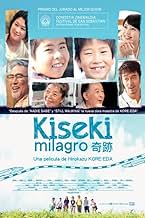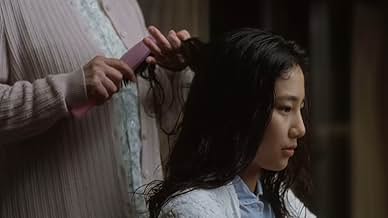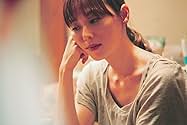IMDb RATING
7.3/10
8.3K
YOUR RATING
Twelve-year-old Koichi, who has been separated from his brother Ryunosuke due to his parents' divorce, hears a rumor that the new bullet trains will precipitate a wish-granting miracle when ... Read allTwelve-year-old Koichi, who has been separated from his brother Ryunosuke due to his parents' divorce, hears a rumor that the new bullet trains will precipitate a wish-granting miracle when they pass each other at top speed.Twelve-year-old Koichi, who has been separated from his brother Ryunosuke due to his parents' divorce, hears a rumor that the new bullet trains will precipitate a wish-granting miracle when they pass each other at top speed.
- Awards
- 5 wins & 9 nominations total
Kôki Maeda
- Koichi
- (as Koki Maeda)
Ôshirô Maeda
- Ryunosuke
- (as Oshiro Maeda)
Nene Ôtsuka
- Nozomi (Mother)
- (as Nene Ohtsuka)
- Director
- Writer
- All cast & crew
- Production, box office & more at IMDbPro
Featured reviews
Two young brothers, Kouichi and Ryuunosuke live apart in Fukuoka and Kagosima because of there parent's divorce. One day they know about a rumour that the person who sees the two new bullet trains passing each other for the first time gains his dream, and they plans to see it to make their wish to live together with their family again. With few friends of them, they goes to their meeting point. This film is very nice. We can see two brother's strong wish and their grow up in their spirits through the trip clearly. However, if I could say one thing, I want to see more about their past, or their life with their parent after they live apart. I could see their desire to live with their family again, but I could not see much trouble or conflict. However other than this, I think this film is very good and moving film.
This is the story of two young Japanese brothers who live apart following the break-up of their parents' relationship. The older boy dreams of his family reuniting and prays for a miraculous intervention in the form of a volcanic eruption, hoping this might lead to his evacuation from his grandparents' region and a return home. Then, when he discovers that the passing of the speeding Bullet trains, approaching from opposite directions, creates a 'cosmic' moment during which wishes are granted, he sets out with a few friends to meet his brother at the meeting point on the railway line. There they make their wishes - with varying results.
The two brothers are forced to deal with the consequences of their parents' choices, ones they have had no part in making. Their belief, to varying degrees, in the power of 'faith' (believing that wishes can come true) then leads them to have to face the consequences of their own choices. Given their youthful immaturity, there is real poignancy in witnessing their confrontation with some harsh realities.
The movie features brilliant performances from the young actors and an excellent supporting cast of adults. There is also gorgeous and evocative cinematography, scenes of the Japanese countryside and its urban impositions, not least the Bullet line itself elevated on its concrete trackbed.
It takes some time, too long perhaps, for the story to gain momentum. But once the youngsters embark on their journey to meet the trains, the story moves at a brisker, more engaging pace. The climax (yes there is a climax, contrary to the view of another reviewer) brings moments of intense beauty and sharp sadness, regret for the loss of childish innocence of as well as optimism in the hope for a better future.
So this is a slow-burner, but persistence brings rewards. Recommended.
(Viewed at The Cornerhouse, Manchester, UK 21.02.13)
The two brothers are forced to deal with the consequences of their parents' choices, ones they have had no part in making. Their belief, to varying degrees, in the power of 'faith' (believing that wishes can come true) then leads them to have to face the consequences of their own choices. Given their youthful immaturity, there is real poignancy in witnessing their confrontation with some harsh realities.
The movie features brilliant performances from the young actors and an excellent supporting cast of adults. There is also gorgeous and evocative cinematography, scenes of the Japanese countryside and its urban impositions, not least the Bullet line itself elevated on its concrete trackbed.
It takes some time, too long perhaps, for the story to gain momentum. But once the youngsters embark on their journey to meet the trains, the story moves at a brisker, more engaging pace. The climax (yes there is a climax, contrary to the view of another reviewer) brings moments of intense beauty and sharp sadness, regret for the loss of childish innocence of as well as optimism in the hope for a better future.
So this is a slow-burner, but persistence brings rewards. Recommended.
(Viewed at The Cornerhouse, Manchester, UK 21.02.13)
If, as many have pointed out, Koreeda is Ozu's cinematic heir, then I Wish is Koreeda's take on Ozu's Good Morning. Both films focus on adorable young kids and Japanese family life, and I have no qualms about saying between the two films, Koreeda easily outdoes Ozu. Not only is Koreeda's depiction of children subtler and more intuitive (no fart jokes here), but he coaxes wonderfully naturalistic performances from his child actors. Is there a director alive who does better work with kids than Koreeda? The movie really takes flight once the kids hit the road on their quest, and I loved the Ozu-ish part where they meet an elderly couple that takes in all the children for a night. Just a wonderful movie with tons of heart. Puts the human in humanistic filmmaking.
I've been impressed with Koreeda's work in the past. "Maborosi" and "After Life" are two excellent, deeply philosophical and moving films. Maybe based on those I had unrealistically high expectations (further inflated by the DVD box boasting a dozen rave reviews & awards), but "I Wish" failed to deliver.
One hour into this 2-hour movie I had to shut it off. Since I didn't watch the whole thing I can't fairly rate it, but I wanted to share my (unpleasant) experience because I wish someone had warned me the same way. This was the first time in my life I've ever shut off a movie from sheer boredom. No, boredom isn't the word. It was more a feeling of total disconnection. The scenes, perhaps attempting to recreate the disconnected, ADD-type thought process of little kids, were so unrelated and random that I became irritated.
Like my title suggests, if you want to see a truly magical film about youth, innocence and the not-so-innocent, hunt down a film called "Kikujiro" (1999). More about that later. First let's talk about "I Wish".
Here is a breakdown of the first hour. Each scene lasts 2-5 minutes. At any time if you become bored, skip to the last paragraph of my review.
Scene 1) a boy grabs a washcloth and cleans his desk. Scene 2) The boy's mother is talking about meaningless things while the grandmother makes random gestures in the air, saying "I'm the wind. I'm a ghost. Etc..." Scene 3) The boys walk to school and complain about the hill. Scene 4) Kids are scolded by a teacher for not doing their homework properly. Scene 5) Kids are in the hall complaining about the teacher. Scene 6) Back to the mother and grandparents talking about vegetable gardens. Scene 7) Jump to some other kids at a swimming pool. Scene 8) The boy stares blankly at his homework assignment. Scene 9) A bunch of old men talk about baking a cake for the festival. Scene 10) The boys are back in school ogling the librarian's legs. Scene 11) The boy's father wakes up, strums a guitar and goes back to sleep. Scene 12) The kids gather and talk about acting.
While I hesitate to call the movie "bad" because I didn't watch it all the way through, I can definitely conclude that the first hour didn't provide enough substance to convince me to keep watching. And trust me, I like slow movies (2001, Werckmeister Harmonies, Hitchcock's Rope). Instead of watching "I Wish", I HIGHLY recommend a Japanese film called "Kikujiro" which this movie seemed to be imitating. However, even though it is slow paced, "Kikujiro" wastes no scenes. They all relate to each other, build upon each other and eventually lead you to a powerful message by the time the film ends. The music in "Kikujiro" (composed by the Japanese master Joe Hisaishi) is also leagues above the mediocre soundtrack of "I Wish", another turnoff. Maybe one day I'll go back & finish the last hour of this film and revise this review if I feel differently. But all the same, I'd rather spend my time watching something else.
One hour into this 2-hour movie I had to shut it off. Since I didn't watch the whole thing I can't fairly rate it, but I wanted to share my (unpleasant) experience because I wish someone had warned me the same way. This was the first time in my life I've ever shut off a movie from sheer boredom. No, boredom isn't the word. It was more a feeling of total disconnection. The scenes, perhaps attempting to recreate the disconnected, ADD-type thought process of little kids, were so unrelated and random that I became irritated.
Like my title suggests, if you want to see a truly magical film about youth, innocence and the not-so-innocent, hunt down a film called "Kikujiro" (1999). More about that later. First let's talk about "I Wish".
Here is a breakdown of the first hour. Each scene lasts 2-5 minutes. At any time if you become bored, skip to the last paragraph of my review.
Scene 1) a boy grabs a washcloth and cleans his desk. Scene 2) The boy's mother is talking about meaningless things while the grandmother makes random gestures in the air, saying "I'm the wind. I'm a ghost. Etc..." Scene 3) The boys walk to school and complain about the hill. Scene 4) Kids are scolded by a teacher for not doing their homework properly. Scene 5) Kids are in the hall complaining about the teacher. Scene 6) Back to the mother and grandparents talking about vegetable gardens. Scene 7) Jump to some other kids at a swimming pool. Scene 8) The boy stares blankly at his homework assignment. Scene 9) A bunch of old men talk about baking a cake for the festival. Scene 10) The boys are back in school ogling the librarian's legs. Scene 11) The boy's father wakes up, strums a guitar and goes back to sleep. Scene 12) The kids gather and talk about acting.
While I hesitate to call the movie "bad" because I didn't watch it all the way through, I can definitely conclude that the first hour didn't provide enough substance to convince me to keep watching. And trust me, I like slow movies (2001, Werckmeister Harmonies, Hitchcock's Rope). Instead of watching "I Wish", I HIGHLY recommend a Japanese film called "Kikujiro" which this movie seemed to be imitating. However, even though it is slow paced, "Kikujiro" wastes no scenes. They all relate to each other, build upon each other and eventually lead you to a powerful message by the time the film ends. The music in "Kikujiro" (composed by the Japanese master Joe Hisaishi) is also leagues above the mediocre soundtrack of "I Wish", another turnoff. Maybe one day I'll go back & finish the last hour of this film and revise this review if I feel differently. But all the same, I'd rather spend my time watching something else.
As a result of their parent's separation, 12-year-old Koichi (Koki Maeda) lives in Kagoshima with his mother (Nene Ohtsuka) and grandparents (Kirin Kiki and Isao Hashizume) while his younger brother Ryunosuke (Oshiro Maeda) lives with his intermittently employed musician father (Jo Adigiri) in Fukuoka. Both talk to each other daily on their cell phone but have not seen each other in six months. Acclaimed Japanese director Hirokazu Koreeda's I Wish is a comedy/drama about the consequences of a split family and of the children's longing to reunite them. In contrast to Nobody Knows, an earlier Koreeda film about children, I Wish will not break your heart.
The brothers (brothers in real life as well) are very different in personality but both seem happy and well adjusted in spite of the difficult circumstances of their life. Ryu is fun loving and his toothless smile will warm your heart. Koichi is more serious and thoughtful but very engaging. He becomes elated when he hears that a bullet train is coming that will connect his city to his brother's. Even more exciting are the rumors that are floating around that when two trains pass each other in opposite directions, your wishes will come true out of the energy the trains create. Koichi's wish is for the nearby volcano to explode so that his family will have to move, and he will be reunited with his brother.
The plan is to meet his brother half-way and do some serious wishing. The fun starts when they have to find creative ways to raise the money. There's also the pesky part about Koichi and his two friends leaving school in the middle of the day. For this he recruits his grandfather to provide an excuse to the school authorities and includes the school librarian who once had a similar experience of wanting to escape from school to attend a concert.
The group of friends of both brothers adds a lot to the film as well. Tasuku (Ryoga Hayashi) wants to marry his teacher, a bit of magic realism there. Makoto (Seinosuke Nagayoshi) wants his dog to come back to life. Megumi (Kyara Uchida), much to her mother's indifference, wants very much to go to Tokyo and become an actress. Kanna (Kanna Hashimoto) wants to be a better painter, and Rento (Rento Isobe) wants to be a faster runner. While the focus of the film are the wishes of the group of children and their trip to the trains' midpoint, the film also provides a rounded portrait of all of its characters without syrup or other sweeteners, though it certainly views children through a somewhat rose-colored lens.
I Wish is a charming and lighthearted film, though its over two hour's length can makes the goings-on a bit tedious. Although the children arrive at the point of realizing that accepting what is can produce happiness, the growth in reaching that point is what the film is about. Ultimately, however, though hoping, wishing, and yearning are all part of childhood, some adults come to realize that, a step beyond wishing and hoping and praying for something to happen, is our ability to create, to make things happen. Unfortunately, most people have not gotten past the hoping stage.
The brothers (brothers in real life as well) are very different in personality but both seem happy and well adjusted in spite of the difficult circumstances of their life. Ryu is fun loving and his toothless smile will warm your heart. Koichi is more serious and thoughtful but very engaging. He becomes elated when he hears that a bullet train is coming that will connect his city to his brother's. Even more exciting are the rumors that are floating around that when two trains pass each other in opposite directions, your wishes will come true out of the energy the trains create. Koichi's wish is for the nearby volcano to explode so that his family will have to move, and he will be reunited with his brother.
The plan is to meet his brother half-way and do some serious wishing. The fun starts when they have to find creative ways to raise the money. There's also the pesky part about Koichi and his two friends leaving school in the middle of the day. For this he recruits his grandfather to provide an excuse to the school authorities and includes the school librarian who once had a similar experience of wanting to escape from school to attend a concert.
The group of friends of both brothers adds a lot to the film as well. Tasuku (Ryoga Hayashi) wants to marry his teacher, a bit of magic realism there. Makoto (Seinosuke Nagayoshi) wants his dog to come back to life. Megumi (Kyara Uchida), much to her mother's indifference, wants very much to go to Tokyo and become an actress. Kanna (Kanna Hashimoto) wants to be a better painter, and Rento (Rento Isobe) wants to be a faster runner. While the focus of the film are the wishes of the group of children and their trip to the trains' midpoint, the film also provides a rounded portrait of all of its characters without syrup or other sweeteners, though it certainly views children through a somewhat rose-colored lens.
I Wish is a charming and lighthearted film, though its over two hour's length can makes the goings-on a bit tedious. Although the children arrive at the point of realizing that accepting what is can produce happiness, the growth in reaching that point is what the film is about. Ultimately, however, though hoping, wishing, and yearning are all part of childhood, some adults come to realize that, a step beyond wishing and hoping and praying for something to happen, is our ability to create, to make things happen. Unfortunately, most people have not gotten past the hoping stage.
Did you know
- TriviaShinkansen wanted to make a movie to promote their bullettrains. They approached Koreeda, an avid trainlover. He came up with this movie.
- ConnectionsFeatured in A Story of Children and Film (2013)
- SoundtracksKAGOSHIMA OHARA BUSHI
Written by Quruli
Performed by Quruli
- How long is I Wish?Powered by Alexa
Details
- Release date
- Country of origin
- Official sites
- Language
- Also known as
- Phép Màu Giữa Đời Thường
- Filming locations
- Production companies
- See more company credits at IMDbPro
Box office
- Gross US & Canada
- $145,808
- Opening weekend US & Canada
- $10,919
- May 13, 2012
- Gross worldwide
- $2,371,548
- Runtime
- 2h 8m(128 min)
- Color
- Sound mix
- Aspect ratio
- 1.85 : 1
Contribute to this page
Suggest an edit or add missing content

































